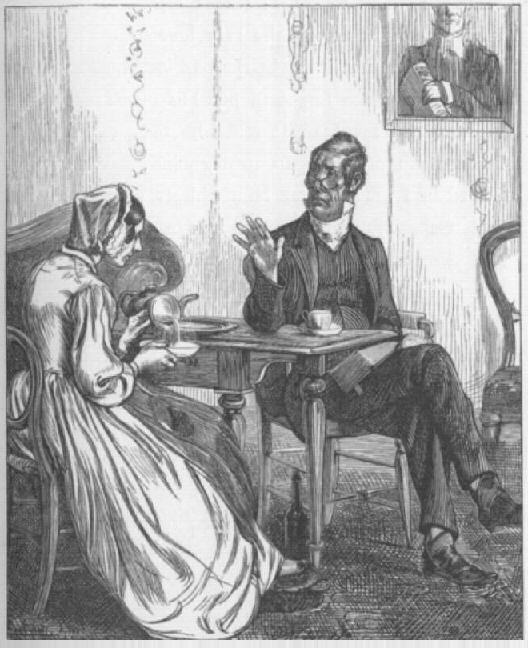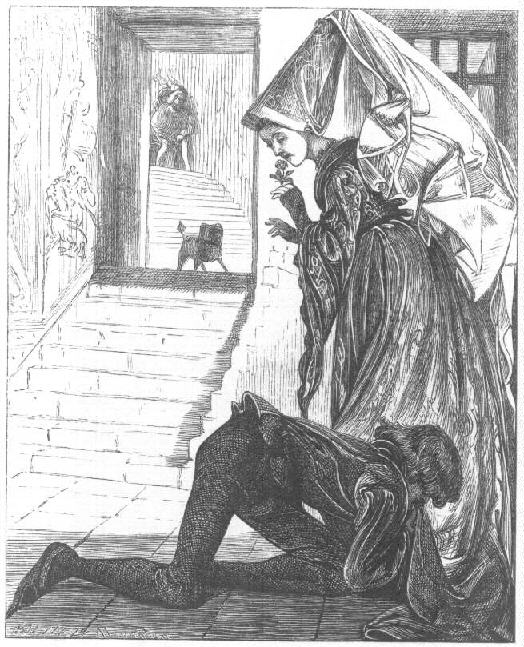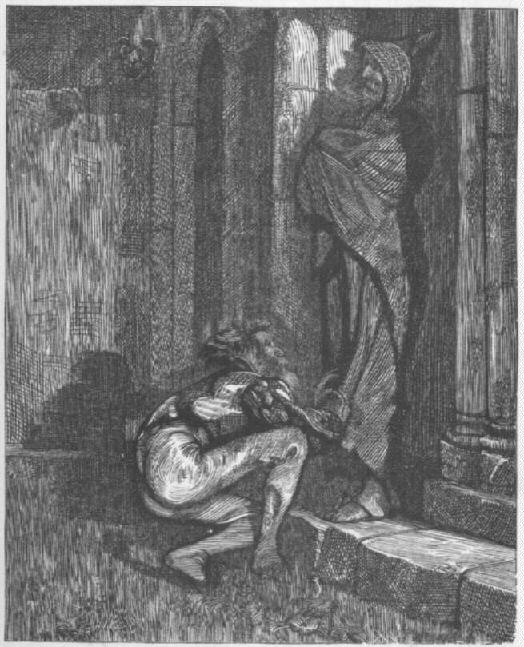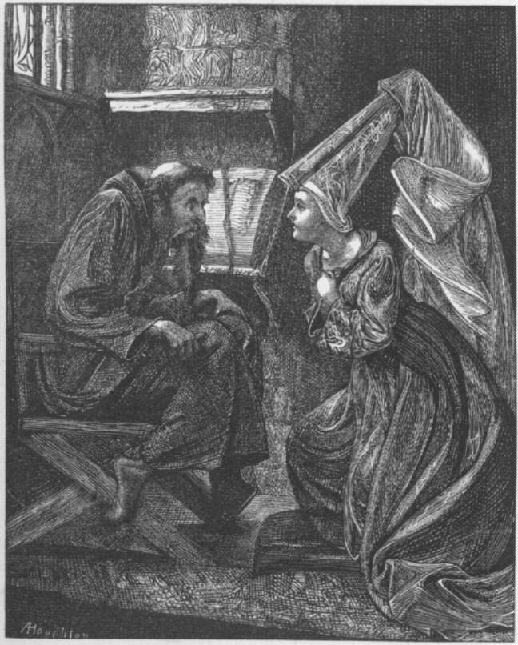|
Ay, grace, I fear, John Galloway was denied,
Though loud and oft for grace he groaned and cried.
‘Sandie,’ he used to say, ‘I fear, I fear 152
I have no right among the holy here;
I fear, I fear that I am in the dark—
The LORD on me forgot to put His mark.
I canna steel my heart to folk who sin,
I canna put my thoughts to discipline;
Oft when I pray, I hear Him whisper plain,
“Jock Galloway, pray awa’, but ’tis in vain;”—
Nae sweet assurance arms me ’gainst the De’il,
Nae happy faith, like that my fellows feel;
I long for GOD, I beg Him on my knee,
But fear He hath to wrath previsioned me!’
JEANIE.
Poor man! his strife was sore; but, Sandie, mind,
Nae man can tell what folks are predestined;
Ev’n Sandie Gourlay may be one the De’il
Hath liberty to catch within his creel!
SANDIE.
Oh, blasphemy! Thou fool, forbear and cease!
The sign o’ grace is perfect faith and peace,
Such as the LORD, in spite o’ many a cross,
Vouchsafes to men like me and neighbour Ross.
But Galloway ever was a braxie sheep, 153
A whining thing who dug his doubts too deep.
Why, mind ye, when old Robin Caird himsel’—
A heretic, a rogue, a man o’ Bel,
Averring written Scripture was a lee,
And GOD was hard, stretched out his limbs to dee,
John by the sinner knelt and offered prayers:
‘LORD GOD,’ he said, ‘pity his poor white hairs!
Be kind unto him! Take him unto Thee!’
And paid the coffin and the burial fee.
‘Sandie,’ he said, when Caird was in his grave,
‘I doubt I am less holy than the lave:*
My blood is milk, and I am weak o’ brain,—
O LORD, it broke my heart to see his pain!
I thought—I dared to think—if I were GOD,
Poor Caird should never gang so dark a road,
And thought—ay, dared to think, the LORD forgi’e!—
To think the LORD was crueller than me;
Forgetting GOD is just, and knoweth best
What folk should burn in fire, what folk be blest.’
Such was his nature, neither strong nor deep,—
Unlike the stern strong leaders of His sheep:
* The rest.
We made an Elder of John Galloway! 154
Large seemed his heart, he ne’er was known to stray;
But he had little strength or wrath severe—
He softened at the sinful pauper's tear;
He gript his purse and pleaded like a fool
For every lassie on the cuttie-stool.
JEANIE.
Where had the parish bairns sae kind a friend?
SANDIE.
Bairns? did he teach them grace, and make them mend?
At Sunday School what lad or lass had care
For fear o’ flaming Hell, if John was there,—
Questioning blushing brats upon his knees,
And slyly slipping in their hands bawbees?*
Once while he talked to me o’ life and death,
I smelt the smell o’ whisky in his breath.
‘Drinking again, John Galloway?’ I said;
As gray as this pipe-reek, he hung his head.
‘O Sandie, Sandie!’ he replied, ‘I ken
I am indeed the weakest man o’ men.
* Halfpence.
Strange doubts torment me daily, and, alas! 155
I try to drown them in the poisoned glass.
By fits I fear! and in my chamber say,
LORD, is Thy mark on poor John Galloway?
And sorely troubled, stealing slyly out,
I try in drink to drown the imp o’ Doubt.’
Woman, is this the man ye would defend?
Nay, wheesht awhile, and hearken to his end.
When he fell sick, in Martinmas, his fears;
Grew deeper far; I found him oft in tears;
Though from the prophets of GOD’s might I read,
He hearkened, but was little comforted,
And even ‘Revelations’ had no power
To soothe the pangs of his departing hour.
A week before he left this vale of woe,
He at his window sat, and watched the snow
Falling and falling down without a sound,
Poured slowly from GOD’s hand upon the ground:
‘See, Sandie, how it snaws!’ I heard him say;
‘How many folk are cold, cold, cold this day!
How many want the fire that’s warming me!
How many starve!—and yet why should it be?’
And when I took the Book, explained, and read,
He only gave a groan and shook his head.
‘Clearer and clearer I perceive my sin, 156
How I to grace may never enter in;
That Book is for the strong, but I am weak.’—
And trembled, and a tear was on his cheek.
JEANIE.
Poor man! poor man! small peace on earth he found.
SANDIE.
The day he died, he called the elders round,
Shook hands, and said, ‘Friends, though I gang from here,
Down under earth, all will at last be clear.
Too long have I been dwelling in the dark,
The LORD on me forgot to put His mark,
GOD help me!’ And, till he was cold as clay,
His foolish lips had little more to say;
Yet after we had laid him down in dust,
Weak to the last we found him, and unjust;
For when his will was read, unto our shame,
The kirk was scarcely mentioned in the same!
But he had left what little gold he had
To Caird’s sick widow and her lass and lad!
[Note:
The revised version of ‘A Scottish Eclogue’ is available in the North Coast - Revisions section.]
157
THE SAINT’S STORY.
(FRANCE, 13—.)
LA BELLE DAME Sans Mercy
Seldom knelt on her knee
To Saints of any degree
Ere she made a Saint of me!
Listen now as spirits can,
Spirit of the sacristan,
And come and join me where I smile,
Sitting cross-legged on my own
Effigy, cut out in stone!
Let us chatter for a while!
How quietly, amid the moonshine faint,
The full-length figure of the blessed Saint
(Myself), with wrinkled brow and broken nose,
Eyes closed and full of dust, upturnéd toes,
And hands so meekly folded on his breast, 158
Lies in the melancholy crypt at rest;
See! how the round eye of the moon looks through
The shapes embroidered on the window-panes,
Saints and Madonnas—purple, orange, blue—
And with their ghosts the marble pavement stains;
Mark, too, the faint religious mist,
Azure and amethyst!
Wherein along the fretted aisle and dim
The shadows of the good stalk now and hymn
The distant cherubim!
Come, sit cross-legged and talk,
And watch them as they walk!
You with your pinched and melancholy face,
Your little nose out of place,
Sitting and stroking slowly at your ease
The spectres of your spider legs and knees,
And jingling spectral keys;
Me, the spectre all forlorn,
Tall and tattered, tossed and torn,
Hollow of cheek, of aspect dreary!
Domine, domine, miserere!
But listen now as spirits can,
Spirit of the sacristan!
A long, long time ago, 159
When you were sacristan,
A wheezy white-haired man,
Who fluttered to and fro
Through the church shadows after prayers,
Or perching on the belfry stairs,
Looked like a big black moth against the light
Of such a moon as shineth here to-night,—
When you were in the land of life, old ghost,
But wrinkled, blind, and deaf as any post,
I was a fine young spark of twenty-one,
Airing my merry beauty in the sun!
Ringlets were curling on my back,
My eyes were bright, my beard was black,
My lips were juicy, and beneath
Sparkled two rows of ivory teeth;
And everywhere I went, by day or night,
The women smiled and tingled with delight.
I clad myself, that all the fair might see,
Like to a blossom-laden apple tree;
I oiled my hair, I gave moustache a twirl,
I rouged my cheeks, powdered my teeth with pearl,
Then, with the air of corsair kings afloat,
The arm-sweep of a king, I drank red wine;
And, in the secret of my chamber, wrote, 160
On many a pink embroidered little note,
Petrarchan sonnets, which I wrote out fine,
That she might read, perchance, and smile on me—
La Belle Dame Sans Mercy.
At the Duke’s court, despite my admiration,
Her charms made no sensation,
Although she was, the Duke himself admitted,
Pleasing and subtle-witted.
Stuff! she was frivolous and narrow,—
Wit? with the brains of a she-sparrow!
But, ah! the witty eyes;
The ringlets shining golden as they shook;
The soft, soft tinkling laughter; and the wise
Half innocent, half crafty look,
Wherewith, with small white finger fluttering gay
To tap your hand, she spake your heart away.
Her lips were sweet bon mots, her eyes a pun,
Her cheeks were sarcasms mocking one to bliss;
And she would give her little glove in fun
The sweetest of all epigrams—a kiss;
Well, for the rest, though older, bolder, colder,
She scarcely reached my shoulder—
A sweetling pale, too delicate to be human, 161
A little white mouse of a woman!
What wonder, then, that there ’mong beauties tall,
And plump, and proud, she wandered lost and small?
And small she was indeed, though sweet,—so sweet,
From little shining head to tiny feet!
And, even as a small doe cropping flowers,
She minced between her teeth this speech of ours,
Till it was small and full of honey-juice,
And fitted for her use.
And there it was! When hidden quite among
The flounced and furbelowed and flimsy throng,
She seemed so meek, so tiny, so unsinning,
I smiled, and dreamed she would be easy winning;
For I was passing comely, as I thought,
And, further, gilded with a little gold;
But, ah! for wealth and glitter she cared nought,
And as for love,—now mark me!—she was cold.
Cold, ancient comrade—yes!
Not cold, though, to her poodle or her dress;
Not cold to the Court scandal and its sweets;
Not cold to ragged hunger in the streets;
Not cold to deep and noticeable grief 162
Or gladness, whatsoe’er the rank and place of it;
Not cold unto the world; and, to be brief,
Not even cold to me upon the face of it.
You take me? Warm as fire
To whatsoever nice sensation chose
To hover ’neath her nose,
Begging her eyes to pity or admire:
Not cold to gracious notice from the Duke;
Not cold entirely to my passionate look;
Not cold unto the dish that she was eating;
Not cold unto the friend whom she was meeting;
Not cold when hearing of your pain or strife;
Not cold to kindly hint or savage comment;
Not cold to aught she looked on, for the moment,
But cold to all the earth, for lasting life.
So, though so sweet and small, as I have stated,
She seemed less charmed than I anticipated,
When, perfumed, powdered, pale, and hungry-eyed,
I followed in her silken train, and sighed.
When on my knee I gave her lily or rose,
Oh, friend! to see her smiles and happy flushes!
To see her hold the gift up to her nose,
And flutter, till the bliss broke out in blushes! 163
But plague! ay, plague upon the wanton head!
Whate’er you did or said,
Whate’er you placed before her peerless eyes,
Within her little bosom would arise
But one emotion, still the same—SURPRISE!
For lily or rose to smell, for book to read,
For the fresh glimpses of the woody mead,
For peeps in spring-tide at a sparrow’s nest,
For peeps all seasons at a bleeding breast,
For compliment, praise, sorrow, wrath, admonishment,
Her answer was—ASTONISHMENT!
Even as a bee a rose’s sweetness rifles,
She played with life, and sipped it best in trifles,
Nor took too greedy draughts of grief or pleasure,
But, slowly tasting, had of both her measure,
Since her small heart discovered deep enjoyment,
Her small brain amplest action and employment,
In delicately hovering on the brink
Of earnest, seeing others plunge and sink.
Thus, floating on the tide where’er it went,
Where’er it chose to carry her content,
She found for ever something here and there
Supremely sweet and fair, 164
Which for the minute occupied the whole
Of body and of soul,
And though she tripped divinely on the border
Of folly, could be wicked in a way,
Keeping her little heart in icy order,
So that it never tempted her astray.
And, mark: had I but known the way to win it,
And had I chosen just the proper minute,
Her heart, though neither amorous nor warm,
Might have been won by storm;
But, just as I approached her on the tide
Of faces, and she raised her hands, and cried,
With blush divine and flutter of amaze,
‘Oh, what a sweet young man!’
Some other novelty drew off her gaze.—
But listen still as spirits can,
Spirit of the sacristan.
Now, when I made my passionate profession,
With eyes serene she criticised my dress,
Peeped at my face, blushing at its expression,
And smiling so divinely, you would guess
Her little mind was busy all the time
165
|



